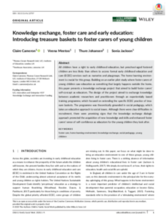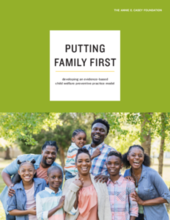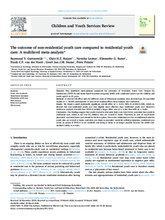Displaying 451 - 460 of 2221
Using an ethnographic approach including interviews, walks, observation and photomap making, this article reports on the findings from a unique pilot study of the social and educational lives of young foster children (aged 0‒4) in an inner London borough.
Building on an earlier pilot study where foster carers of young children saw education as something that largely happens outside the home, this paper presents a knowledge exchange project that aimed to build foster carers' self‐concept as educators.
This study addresses the ethnic identity of transculturally placed adolescent foster youth with ethnic minority backgrounds in The Netherlands. The authors conducted qualitative interviews to provide insight into the lifeworlds of twenty foster youth. They found that constructing an ethnic identity was complex for these ethnic minority foster youth.
This paper from the Annie E. Casey Foundation provides guidance for state child welfare agencies on what to consider when developing a preventive practice model that aligns with the requirements of Family First, addresses the unique needs of families within local communities and ensures that selected programs and practices are feasible to implement with quality.
This paper offers some insight into the benefits, impacts and challenges of the ‘creative mentor’ role. It links to a social pedagogy framework, supporting practice, and draws on creative mentors’ work with children and young people living in care. It aims to inform professionals and teams around a child about the transforming nature of working with creativity – beyond the obvious external experiences.
Preliminary findings from studies using abbreviated formats of Parent-Child Interaction Therapy (PCIT) suggest effectiveness of such adaptations in reducing externalizing behavior in foster children and maintaining behavioral improvements several months after the end of the treatment.
This multilevel meta-analysis compared the outcomes of Treatment Foster Care Oregon for Adolescents (TFCO-A) and home-based treatment programs (HBT) with residential youth care for children and youth aged 0 to 23 years.
For this study, one hundred and twenty‐six 11–21 year olds (53 who had experience of the care system and 73 who did not) were recruited from the community and NHS. All participants had self‐harmed in the past 6 months. Participants completed an Audio Computer‐Assisted Self‐interview (ACASI) regarding their views about the support they had received, how helpful it was, and what further help they felt they needed.
In this chapter, the authors describe the scale-up and impact of a linked multilevel intervention in a public child welfare system.
This study aimed to examine characteristic and outcome of mothers and babies focusing on the teen-mothers and their existing risk-behaviors, also to evaluate factors associated with subsequent foster care placements of their infants.



